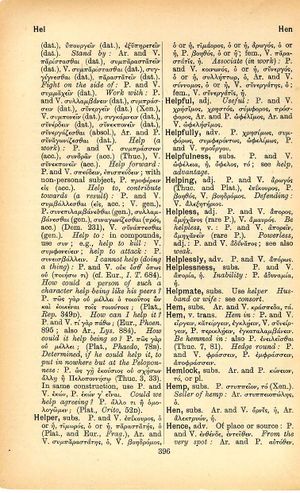hem: Difference between revisions
ὃν οὐ τύπτει λόγος οὐδὲ ῥάβδος → if words don't get through, neither a beating will | if the carrot doesn't work, the stick will not work either | whom words do not strike, neither does the rod
(CSV4) |
(6_7) |
||
| Line 6: | Line 6: | ||
<b class="b2">Be hemmed in</b>: also P. ἐνειλεῖσθαι (Thuc. 7, 81). | <b class="b2">Be hemmed in</b>: also P. ἐνειλεῖσθαι (Thuc. 7, 81). | ||
<b class="b2">Hedge round</b>: P. and V. φράσσειν, P. ἐμφράσσειν, ἀποφράσσειν. | <b class="b2">Hedge round</b>: P. and V. φράσσειν, P. ἐμφράσσειν, ἀποφράσσειν. | ||
}} | |||
{{Lewis | |||
|lshtext=<b>hem</b>: (also em, and [[often]] [[confounded]] in MSS. and edd. [[with]] em and en, q. v.), interj., an [[expression]] of [[surprise]], in a [[good]] or [[bad]] [[sense]]; of [[admiration]], [[joy]], of [[grief]], [[indignation]], etc. ([[like]] the intensive [[ehem]], an [[expression]] of [[joyful]] [[surprise]]),<br /><b>I</b> oho! [[indeed]]! [[well]]! [[well]] to be [[sure]]! hah! [[alas]]! alack! Ag. Ego [[sum]] ipsus, quem tu quaeris. Ha. Hem! [[quid]] ego [[audio]]? Plaut. Poen. 5, 2, 86; cf. Ter. And. 3, 1, 4: [[hem]], Pamphile, [[optime]] te mihi offers, id. ib. 4, 2, 3: Er. Itane [[Chrysis]]? [[hem]]! My. Nos [[quidem]] pol miseras perdidit, Ter. And. 4, 5, 8; cf. id. Eun. 5, 1, 11: miserum me! [[quanto]] haec dixi cum dolore! [[hem]], Postume, [[tune]] es, etc., Cic. Rab. Post. 17, 45: occepi [[mecum]] cogitare: [[hem]], biduum hic Manendum est soli [[sine]] [[illa]], Ter. Eun. 4, 2, 8: [[hem]] [[tibi]] maledictis pro istis, Plaut. Curc. 1, 3, 39; cf. id. Ps. 1, 2, 22: [[hem]], [[quid]] ais, [[scelus]]? Ter. And. 4, 1, 42; cf.: audistin', [[obsecro]]? [[hem]] scelera, id. ib. 4, 4, 47: [[hem]] nos homunculi indignamur, si [[quis]], etc., Sulp. ap. Cic. Fam. 4, 5, 4; Ter. Phorm. 4, 4, 7. | |||
}} | }} | ||
Revision as of 08:20, 13 August 2017
English > Greek (Woodhouse)
subs.
Ar. and V. κράσπεδα, τά. v. trans. Hem in: P. and V. εἴργειν, κατείργειν, ἐγκλῄειν, V. συνείργειν, P. περικλῄειν, ἐγκαταλαμβάνειν. Be hemmed in: also P. ἐνειλεῖσθαι (Thuc. 7, 81). Hedge round: P. and V. φράσσειν, P. ἐμφράσσειν, ἀποφράσσειν.
Latin > English (Lewis & Short)
hem: (also em, and often confounded in MSS. and edd. with em and en, q. v.), interj., an expression of surprise, in a good or bad sense; of admiration, joy, of grief, indignation, etc. (like the intensive ehem, an expression of joyful surprise),
I oho! indeed! well! well to be sure! hah! alas! alack! Ag. Ego sum ipsus, quem tu quaeris. Ha. Hem! quid ego audio? Plaut. Poen. 5, 2, 86; cf. Ter. And. 3, 1, 4: hem, Pamphile, optime te mihi offers, id. ib. 4, 2, 3: Er. Itane Chrysis? hem! My. Nos quidem pol miseras perdidit, Ter. And. 4, 5, 8; cf. id. Eun. 5, 1, 11: miserum me! quanto haec dixi cum dolore! hem, Postume, tune es, etc., Cic. Rab. Post. 17, 45: occepi mecum cogitare: hem, biduum hic Manendum est soli sine illa, Ter. Eun. 4, 2, 8: hem tibi maledictis pro istis, Plaut. Curc. 1, 3, 39; cf. id. Ps. 1, 2, 22: hem, quid ais, scelus? Ter. And. 4, 1, 42; cf.: audistin', obsecro? hem scelera, id. ib. 4, 4, 47: hem nos homunculi indignamur, si quis, etc., Sulp. ap. Cic. Fam. 4, 5, 4; Ter. Phorm. 4, 4, 7.

